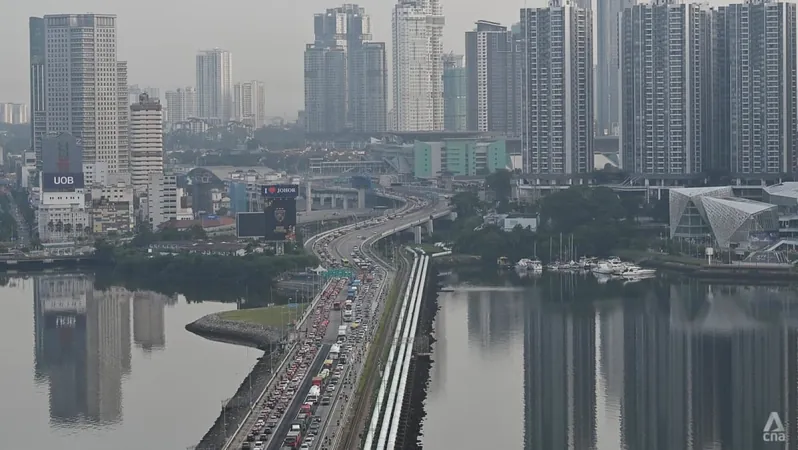
Singaporean Investors in Legal Tangle with Malaysian Developer Over Johor Condo Ownership Dispute
2024-12-27
Author: Wei
JOHOR/SINGAPORE: In a shocking turn of events, Sebastian Tan, a Singaporean who purchased a three-bedroom condominium in Johor for approximately S$275,000 (US$184,000), recently discovered that he is not the rightful legal owner of his property. This revelation came during a casual conversation with a lawyer friend, leading Tan to realize that he was misled about the nature of his investment.
Initially under the impression that he had acquired a 99-year leasehold unit, Tan learned instead that his purchase was through a Private Lease Scheme (PLS), a lesser-known framework in Malaysian real estate. Under this scheme, the developer retains ownership of the property while tenants purchase a long-term lease, essentially functioning like an extended rental agreement. This contrasts sharply with the straightforward ownership structures typically found in Singapore.
A Rising Storm of Legal Challenges
Adding to Tan’s frustration is the discovery that his unit’s value has "dropped tremendously." He is among a growing cohort of around 100 homebuyers embroiled in a legal dispute against the developer, claiming that vital information regarding the ownership rights was concealed from them. They are seeking to amend the strata title to achieve full ownership.
"I think we are looking for a fair and reasonable outcome for everyone," said Tan, expressing his desire for better clarity and ownership rights. Some buyers in the group are now contemplating the viability of renting or selling their units, which may complicate financial plans further.
Understanding the PLS: A Legal Dilemma
Malaysian lawyers have informed affected buyers that while the PLS is indeed legal, the vague terms of the standard sales and purchase agreement (SPA) have caused significant confusion. Chee Hui Bing, a lawyer at Chris & Partners Advocates & Solicitors, explained that buyers may mistakenly believe they are securing ownership rights when they are merely acquiring an extended tenancy.
In light of this, real estate experts recommend that international buyers thoroughly understand the local property landscape before making significant investments. Tris Xavier, head of the integrated property practice group at Yuen Law, emphasized that buyers must be aware that selling an interest in a PLS property differs dramatically from selling legal ownership.
The Broader Context: Growing Interest in Johor Properties
Johor has emerged as a leading destination for Singaporeans investing in overseas property, driven by affordable prices and proximity to Singapore. The area has seen a remarkable surge in property values, with prices soaring nearly 30% in the first half of this year alone compared to pre-pandemic levels. Savills Malaysia’s group managing director, Paul Khong, notes that Johor's lower cost of living and better connectivity make it particularly appealing.
As many Singaporean companies consider moving their operations to Johor, the demand for residential properties is expected to rise. Businessman James Lim exemplifies this trend, having purchased an apartment across the Causeway to facilitate his business ventures within the Johor-Singapore Special Economic Zone (SEZ).
A Cautionary Tale for Investors
This situation highlights the potential pitfalls for overseas property investors, particularly regarding unfamiliar legal frameworks. With several buyers filing complaints against the involved real estate agency, this case serves as a stark reminder that prospective buyers should exercise due diligence by consulting professionals familiar with local laws and market conditions.
The increasing interest from Singaporeans in Johor doesn't just signify a desire for investment. It also reflects shifting lifestyles and growing possibilities for expatriation, especially as developments in the JB area promise improved living conditions.
As this dispute unfolds, many will be watching to see whether affected buyers can secure the ownership rights they initially believed they had attained—as the ultimate resolution could affect the confidence levels for future Singaporean investments in Malaysian real estate.
 Brasil (PT)
Brasil (PT)
 Canada (EN)
Canada (EN)
 Chile (ES)
Chile (ES)
 Česko (CS)
Česko (CS)
 대한민국 (KO)
대한민국 (KO)
 España (ES)
España (ES)
 France (FR)
France (FR)
 Hong Kong (EN)
Hong Kong (EN)
 Italia (IT)
Italia (IT)
 日本 (JA)
日本 (JA)
 Magyarország (HU)
Magyarország (HU)
 Norge (NO)
Norge (NO)
 Polska (PL)
Polska (PL)
 Schweiz (DE)
Schweiz (DE)
 Singapore (EN)
Singapore (EN)
 Sverige (SV)
Sverige (SV)
 Suomi (FI)
Suomi (FI)
 Türkiye (TR)
Türkiye (TR)
 الإمارات العربية المتحدة (AR)
الإمارات العربية المتحدة (AR)